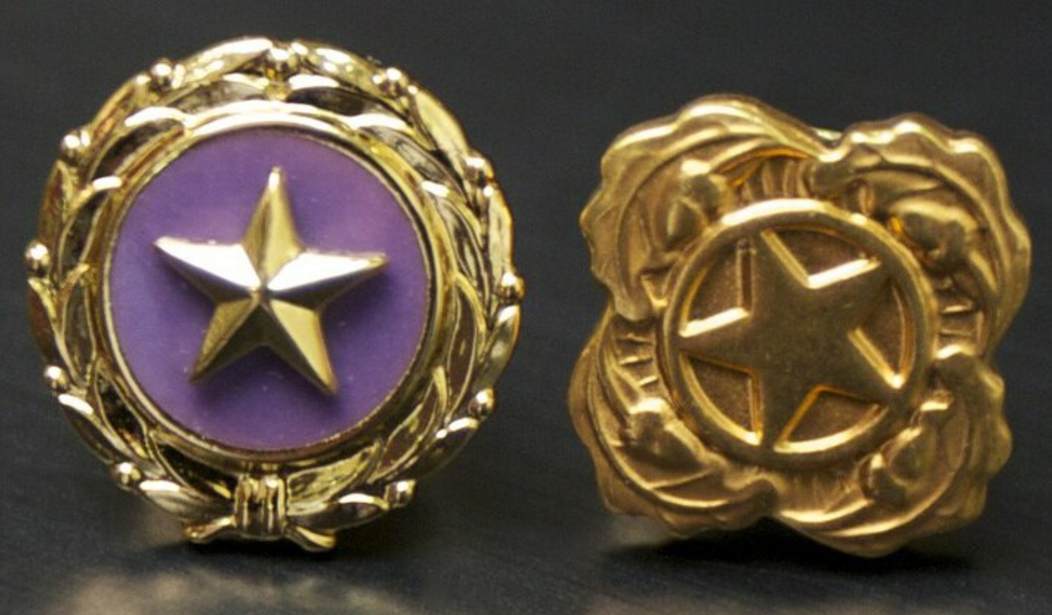Who deserves to be honored with the Gold Star designation?
American military families have hung blue and gold star flags in their windows since World War I. The blue star signified a family member serving in the military. If the service member died, the blue star was replaced with a gold one. Later, the designation was formalized to include a Gold Star lapel pin. Congress passed a bill in 1947 that defined who was eligible for the Gold Star flag and pin.
Among the actions that qualified for Gold Star status were dying “in military operations involving conflict with an opposing enemy force” or "in a terrorist attack against the United States."
It should be pointed out that the Gold Star designation is sacred in the military, and any changes are going to be controversial.
Now the Pentagon is quietly looking to expand the definition of a Gold Star recipient. The new, expanded designation will include suicides and those who died in accidents such as helicopter or plane crashes.
There's already a designation for active duty personnel who die off the battlefield. It's known as a "Next of Kin" pin. Both Gold Star and Next of Kin families receive the same benefits, but the difference in how the military culture views the two is much different.
The Gold Star title is a “unique and special honor for those who have given their lives in defense of this nation in combat,” said retired Gen. Mark A. Milley, the former Chairman of the Joint Chiefs of Staff. Milley is opposed to expanding the definition of who deserves a Gold Star.
Indeed, to many involved in the debate, it's a troubling issue.
The effort to broaden the Gold Star definition is led by the Tragedy Assistance Program for Survivors (TAPS), an influential nonprofit established in 1994. Andy Weiss leads Chicago-area grief support groups for the organization. Its founder, Bonnie Carroll, lost her husband, Army Brig. Gen. Tom Carroll, in a plane crash in Alaska two years earlier, and in 2015 received the Presidential Medal of Freedom for her work.
In a June letter to senior lawmakers, TAPS and a few dozen other military and veterans nonprofits made their case that it’s time for Congress to legislate an “inclusive definition” that recognizes an array of military deaths. The signatories estimated that doing so would cover about 3 million people, and include all kinds of survivors, any time Congress looks anew at the government benefits provided to military survivors. Past legislation, they argued, has not included consistent language, muddying understanding of what a Gold Star family is.
“Creating a consistent, legal definition,” the letter said, “will ensure future legislative proposals improve benefits for ALL surviving families.”
There has been some support from military-connected non-profit groups like Blue Star Families, the Independence Fund, and the Military Officers Association of America.
But the American Legion, Wounded Warriors Project, and Afghanistan Veterans of America (IAVA) have withheld support so far.
Many in the military who deal with grieving families don't see any reason to change the definition.
“Loss is loss, and I run an organization that represents and has programming for families who have lost a loved one, no matter the circumstances,” Ryan Manion, chief executive officer of the Travis Manion Foundation, said. “But I think we run a slippery slope when we try to take a specific designation or recognition and expand that.”
Allison Jaslow, an Iraq War veteran who is CEO of IAVA, said, "What I wouldn’t want to do is for the sake of inclusivity not appropriately honor those who truly made the ultimate sacrifice on behalf of our country.”
The fact is that Gold Star families guard the legacy of their fallen loved ones fiercely — as well they should.
The American Legion in May drafted a resolution defining Gold Star status narrowly as close family members of someone who has been killed or died in a variety of other actions overseas. Matthew Shuman, a senior official with the organization, said members discussed the issue for some time and decided to act as it became apparent Congress was interested.
Carroll, the TAPS founder, said that ultimately her objective is to eliminate the “hierarchy of grief” that can compound the challenges mourning families face.
To me, this is an unnecessary dispute, and the Pentagon erred in creating a commission to look at making the Gold Star designation "more inclusive." Don't mess with the sacred. You're only going to hurt the feelings of someone who was excluded or who doesn't think it's necessary to change anything.










